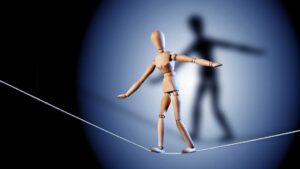Do you struggle with midday malaise? Do you find yourself dragging as the day goes on and operate at a fraction of your mid-morning productivity?
It’s one of the most common challenges I hear from my clients in high-level, high-pressure roles. No matter how much they have on their plate, their productivity tends to drop precipitously after noon.
While many blame this effect on external forces, the real issue is the choices you make about your afternoon work strategy.
What Affects your Afternoon Productivity?
Everything you do.
That comment may sound flippant, but I’m very serious. Your afternoon slump may be caused or impacted by all the choices you make during the night before and in the morning, including:
- Sleep. A third of US adults and 42 percent of leaders are not getting enough sleep to fuel their daily activities. Poor sleep impacts the ability of leaders to manage proactively and decreases the engagement of their teams as well.
- Nutrition. Your body reacts to the high-glycemic food you choose to eat at lunch or as a quick pick-me-up snack between meetings.
- Your movement. Hours of sitting combined with little to no movement turns on cancer promoting genes, stores fat, and increases incidences of hypertension and cardiovascular disease, the leading cause of death in women and men.
- Your stress and anxiety levels. Negative stress can build up in a short period of time and stressful experiences in the morning weigh on us throughout the day.
By midday, we need to acknowledge and own the impact of these stressors on our health, our performance, and often overlooked, our relationships.
Most everyone will experience energy ebbs and flows throughout the day as a result of their circadian rhythms. The key is to maximize opportunities for energy regeneration and reduce the impact of those energy shifts and afternoon slumps.
What’s the solution? Recovery and renewal.
If your days are filled with back-to-back meetings, if you’re compelled to multi-task given expanding workloads, and if you’re continually confronted with priority churn or a never-ending task list, it’s easy to say you have no time to recover.
As the day wears on, though, you progressively deplete your energy to the point that you have nothing left to give. Functioning under a high negative stress burden, you shift to reactivity, make poorer decisions, and damage your relationships with colleagues and with other important people outside your workplace.
Avoiding the Reactivity Trap
When you’re in a high negative stress state, how much fun are you to be around?
Once you’re in this state of negative stress and reactivity, it can be difficult to pull yourself back out. The better choice? Cut it off early by choosing to renew and restore energy before you naturally start to flag.
Use some of these tools to set the stage for afternoon productivity that will leave you feeling more energized and that will benefit both you and the people you care most about.
Sleep
Sleep is an X-factor for performance. A wide-ranging analysis of sleep studies indicates that people who sleep well do almost everything better – from learning to decision-making to impulse control. To learn better, lead better, and connect better— sleep better.
A short power nap before the afternoon slump can refresh you. Ask supposed pro-nap companies like Google, Ben and Jerry’s, Uber, and Facebook.
The same goes for a coffee nap, where you drink a cup of coffee before resting for 20 minutes. The coffee blocks deep-sleep-inducing hormones, so you get a bigger bang for your sleep buck and wake up refreshed.
Restorative sleep is the most critical resource and will have an impact throughout your day. Aim for 8 hours a night and for catching up if you start falling into sleep debt.
Nutrition/Fasting
Skipping meals during the workday can lead to shorter-term focus and increased reactivity in decision making.
Sub-optimal nutrition can do the same. Instead of the quick burst of energy and accompanying crash that comes from a high-glycemic index snack or lunch, opt for a low-glycemic meal (more protein and complex carbs, fewer simple sweet or starchy carbs).
Condensing your nutrition to a consistent eight to 10-hour window during the day can also optimize your body’s ability to recover and to make the most of your sleep hours rather than spending them processing your food.
Movement “Snacks”
Neuroscientist Dan Wolpert says, “We have a brain for one reason and one reason only. And that’s to produce adaptable and complex movement.”
Moving with intention powers your brain. If you want to be smarter, healthier, more focused, and want to cultivate real resilience — move more.
Spending an hour in the gym during the workday isn’t feasible for most of us, given the demands of our schedules and obligations. Instead, look for ways to add purposeful movement “snacks” into your day.
Spend a few minutes doing something that reinvigorates you, whether it’s rapidly taking a few flights of stairs or doing a few minutes of high-intensity interval training. Research shows that just 10 minutes of exercise can boost your cognitive performance by 14 percent.
Yoga stretching, for example, provides a host of benefits for office workers, from enhancing brain function to reducing back pain to aiding in restful sleep. Researchers found that regular yoga practitioners developed increased gray matter and greater cortical thickness, which contribute to better mental function and higher intelligence.
When should you start fighting the afternoon slump? Before it happens. Pay attention to your energy levels and respond accordingly. Typically, people feel depleted after 90 minutes of steady work and meetings without a break.
Recent research from Microsoft indicates the stress buildup in the brain from working without pausing can be detrimental, and Amazon head Jeff Bezos avoids making high-impact decisions after mid-morning because he doesn’t want the quality of his decision making to be impaired by lower energy levels or mood later in the day.
If you’re not fully in control of your schedule, you may not have this luxury. However, you do have an opportunity to power up a little before you head into your afternoon.
With every decision, you’re either using or regenerating energy. Instead of showing up in the afternoon with what’s left of your depleted energy, it takes a commitment to yourself and your well-being to bring your best self to every part of your day, to every decision and every interaction.
This article was originally published on Forbes.com where Andrew Deutscher is an expert contributor.



